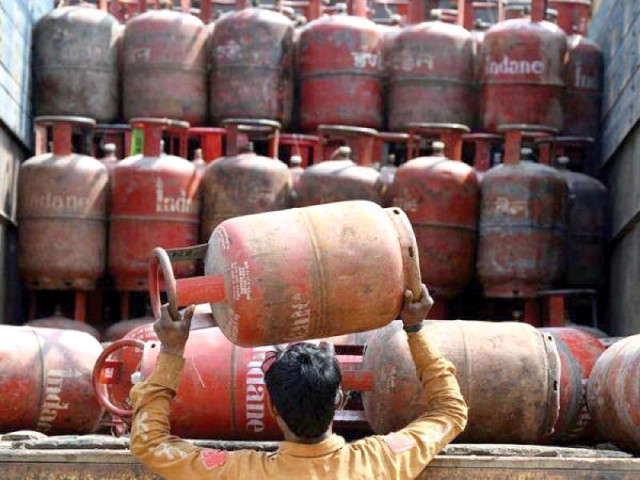LPG scam surfaces during emergency moot
Importers of liquefied petroleum gas minted around Rs20b due to misuse of incentive

Private sector importers pocketed billions of rupees due to misuse of the government’s Liquefied Petroleum Gas (LPG) Policy 2015 – a fact revealed during an emergency meeting that the Petroleum Division held on Sunday to discuss the new LPG policy with relevant stakeholders.
Under the 2015 policy, the local LPG producers paid 17% general sales tax (GST) whereas the importers paid only 10% GST due to an incentive announced for them by state-run Pakistan State Oil (PSO) and the Sui Southern Gas Company (SSGC).
As a result of this unjustified cut in the GST, the LPG importers pocketed around Rs20 billion. Interestingly, in its revised draft, the Petroleum Division had proposed further waiver of advance tax for the LPG importers, enabling the importers to pocket more money.
The government had imposed petroleum levy in the LPG Policy 2015 on locally produced LPG to equate prices with the imported LPG. The LPG Policy 2015 also promised tax incentives for the PSO and the SSGC to encourage import in a bid to provide subsidized LPG to the poor.
Read: Govt changes stance on LPG policy
However, these two state-run companies could not import LPG substantially and the private importers availed all these tax incentives by importing the LNG in bulk.
During the meeting on Sunday, the LPG stakeholder raised the issue.
The petroleum rules bind the government and private sector to import deficit products.
However, private sector importers had imported LPG in bulk and excess quantity without following these rules. The Petroleum Division and the Oil and Gas Regulatory Authority (Ogra) had failed to implement these rules.
This resulted in forcing the state-run LPG producers like the Oil and Gas Development Company Limited (OGDCL), Pakistan Petroleum Limited (PPL) and Pak Arab Refinery (Parco) to reduce prices. This resulted in a loss to national exchequer as the government is the major shareholder of these companies.
LPG pricing
At present, the LPG prices are linked with Saudi Aramco Contract Price (CP). However, the Petroleum Division had proposed to link the LPG price with cost and freight (C&F) price that will be over and above the current price of $80 per ton.
Sources said the local LPG producers had raised the issue that all LPG imports were coming from Iran at a discount of $180 to $200 per ton compared to the CP price.
The local LPG industry was surprised why the Petroleum Division wanted to link it with the C&F price when the LPG imports were already at a lower price.
New draft of LPG policy
The sources said the majority of the LPG stakeholders had attended the meeting without an invitation. They said that the Petroleum Division had invited few LPG stakeholders so that it could get a nod on the policy ahead of placing it before the Cabinet Committee on Energy (CCoE) on Monday (today).
The Petroleum Division issued notification for a meeting on Friday evening and called a meeting at 6pm on Sunday. At the meeting, the LPG industry described the emergency meeting as an attempt on part of the Petroleum Division to approve a policy sans consultation.
The industry raised objections to the new proposed LPG pricing mechanism, imposition of petroleum levy on locally produced LPG, disparity in taxes, violation of the LPG Policy 2015 and auction of the LPG.
During the meeting, local LPG producers like OGDCL, Parco, PPL and MOL raised objections to auction off the LPG on a monthly basis instead of using the existing mechanism of allocating the LPG on a long term basis. The Petroleum Division had proposed an auction of the LPG quota on a monthly basis.
Read more: Local LPG producers seek level playing field
Local industry said that LPG marketing companies need to invest on building the LPG storages. Therefore, long term allocation of LPG quota encouraged the LPG companies to invest in infrastructure.
They said no company will invest in building infrastructure if they are not guaranteed long term allocation of the LPG. However, they said that LPG producers should be allowed to auction the LPG on a monthly basis if they have surplus gas.
State-run LPG producers raised the issue that oil refineries also produced the LPG. If they are unable to dispose of the LPG due to issues in auctioning gas they will drop production.
This will result in low uplift of gas from the oil exploration companies by refineries. Therefore, it would also impact supply of natural gas and crude oil to refineries if they cut production due to surplus stocks.
Responding to a question relating to the LPG scam, the Petroleum Division officials said the PSO and SSGC faced issues in importing the LPG due to the Public Procurement Regulatory Authority (PPRA) rules.
In the new policy, the Petroleum Division had proposed to waive the PPRA rules for these companies to facilitate them in importing the LPG.



















COMMENTS
Comments are moderated and generally will be posted if they are on-topic and not abusive.
For more information, please see our Comments FAQ